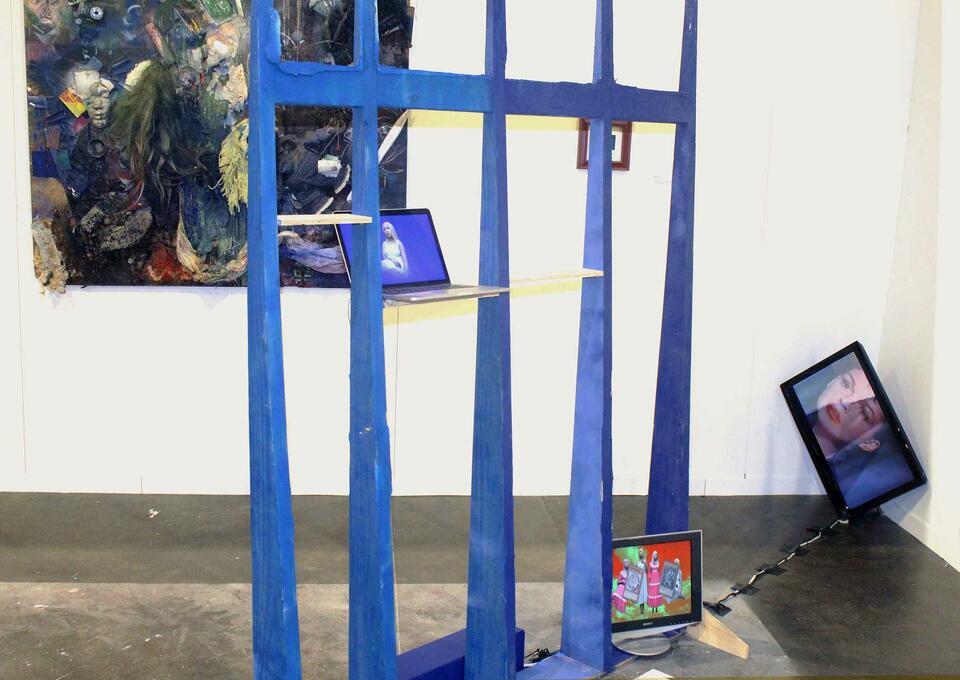Pear Jansomwong and Kexin Wang
ChromaCalm
ChromaCalm represents the fusion of art and technology, aimed at enhancing human cognition through innovative design. As an interdisciplinary project, it leverages lightweight AR glasses to directly address the challenges of working memory and focus in our everyday lives. These glasses, crafted with user-centric design principles, utilize advanced algorithms to dynamically filter and manage visual information, prioritizing task-related data and minimizing distractions.
This technology embodies a breakthrough in cognitive science, providing a non-invasive tool to bolster concentration, particularly for individuals facing challenges such as ADHD. By redefining the interface between our sensory perceptions and the overflow of ambient information, ChromaCalm offers a practical solution to the problem of cognitive overload in modern environments.
The project invites users to experience a new form of interaction where technology quietly enhances human capabilities, allowing for deeper concentration and improved productivity in learning and professional tasks.
ChromaCalm is an innovative augmented reality (AR) tool designed to enhance cognitive efficiency and focus by managing sensory input. This technology utilizes a lightweight AR glasses system that dynamically filters and modulates visual environments to minimize distractions and prioritize task-relevant information. By employing real-time video segmentation and advanced algorithms, ChromaCalm adjusts the visual field to highlight essential elements and dim background noise, facilitating concentration and mental performance.
Intended for individuals with attention challenges, such as those with ADHD, or anyone seeking to improve their mental concentration and learning capabilities, ChromaCalm is particularly beneficial in academic and professional settings. The device integrates cutting-edge technologies, including machine learning models for environmental interaction and eye-tracking sensors, to tailor the user experience to individual needs and preferences. This seamless integration of hardware and software positions ChromaCalm as a practical solution for enhancing daily productivity and cognitive engagement.
Image
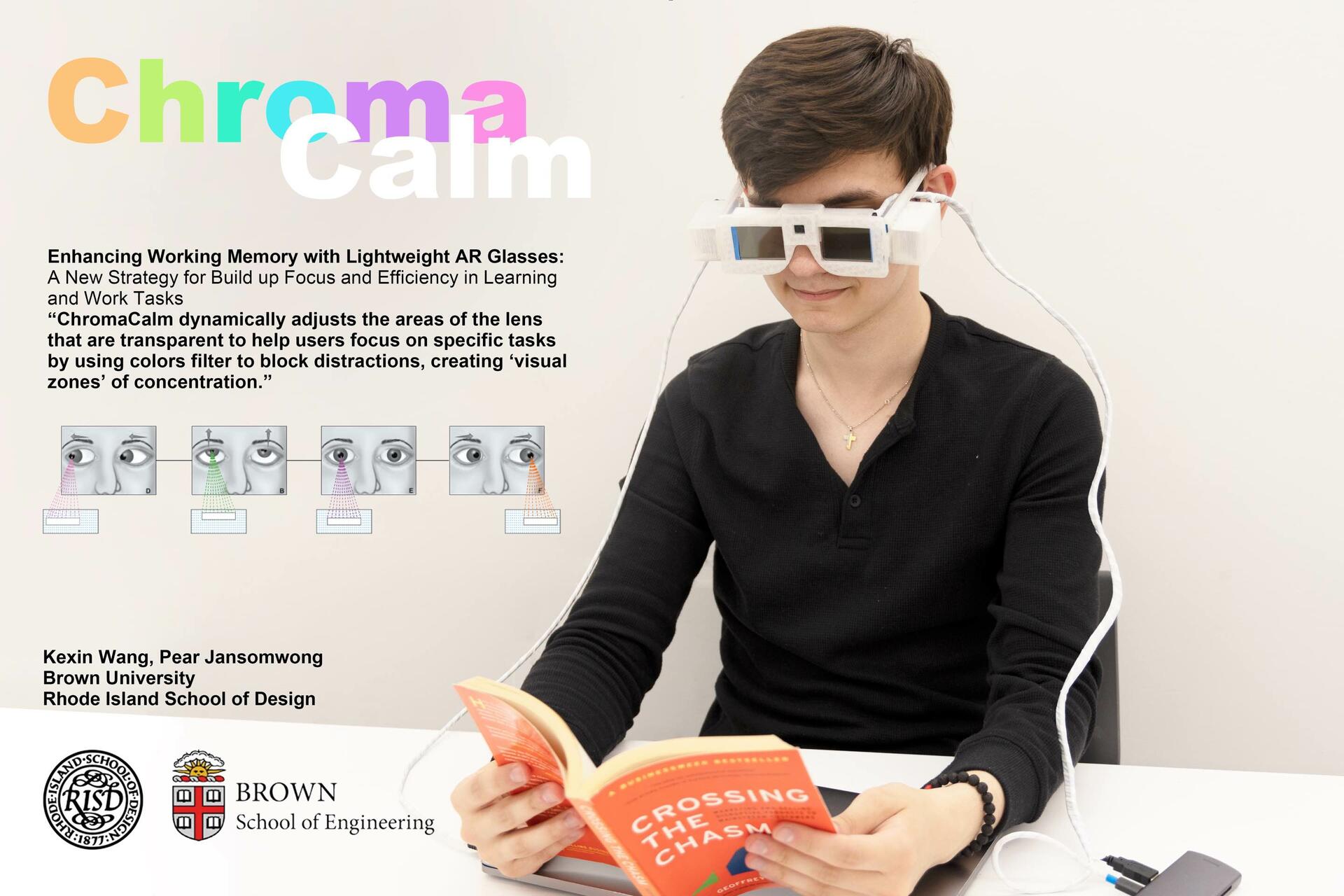
Kexin Wang and Pear Jansomwong showcase ChromaCalm, innovative AR glasses designed at Brown University and RISD. These glasses dynamically adjust transparency to enhance focus and reduce distractions by creating visual zones tailored to specific tasks.
Enhanced Focus through Advanced Technology
ChromaCalm utilizes state-of-the-art technology to tailor the visual experience for optimal cognitive performance. The glasses are equipped with real-time video segmentation technology that actively distinguishes between task-relevant and irrelevant visuals. This selective visual enhancement is crucial for users who require concentrated focus, such as students and professionals.
Moreover, ChromaCalm integrates machine learning algorithms that continuously learn from the user's behavior and environment, fine-tuning the visual modifications to suit individual needs. This personalization ensures that each user experiences the most conducive environment for their specific tasks.
The inclusion of eye-tracking technology further enhances this personalization by adjusting the visual field in real-time based on where the user is looking. This feature ensures that the focus zones remain aligned with the user's actual point of attention, minimizing cognitive load and preventing distraction.
These technological integrations not only make ChromaCalm a cutting-edge tool in enhancing working memory but also position it as an essential aid for anyone looking to improve their productivity and mental focus in an increasingly distracting world.
Image
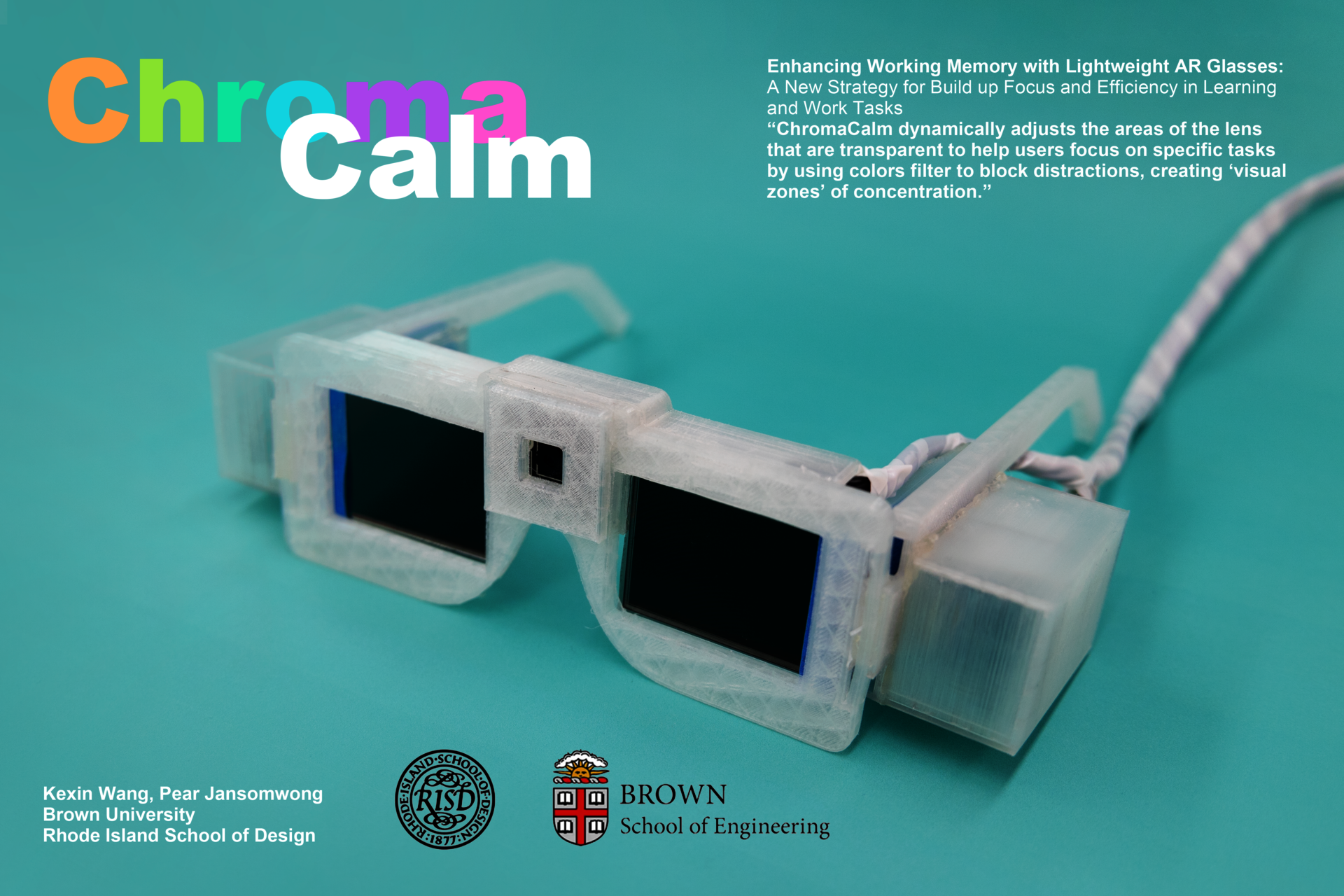
Close-up view of the ChromaCalm AR glasses. These innovative glasses adjust lens transparency to enhance focus and reduce distractions, facilitating concentrated work and study.
Using ChromaCalm Glasses
Initialization: Users start by wearing the ChromaCalm glasses and verbally stating the current task they are focusing on. This helps the glasses understand which task to prioritize visually.
Voice Commands: As users speak, the built-in microphone picks up voice commands. The system, powered by ChatGPT, identifies key words related to the task to ensure relevant visual enhancements are made.
Visual Focus: Once the task is set, the glasses adjust their display. They show non-essential elements in color, and the area of focus remains clear. This visual differentiation helps concentrate on the task at hand without distractions.
Real-Time Tracking: The glasses use video segmentation to track and highlight the object or area the user is working on. They also generate graphics that clearly delineate the active work zone, ensuring that focus is maintained precisely where needed.
Image
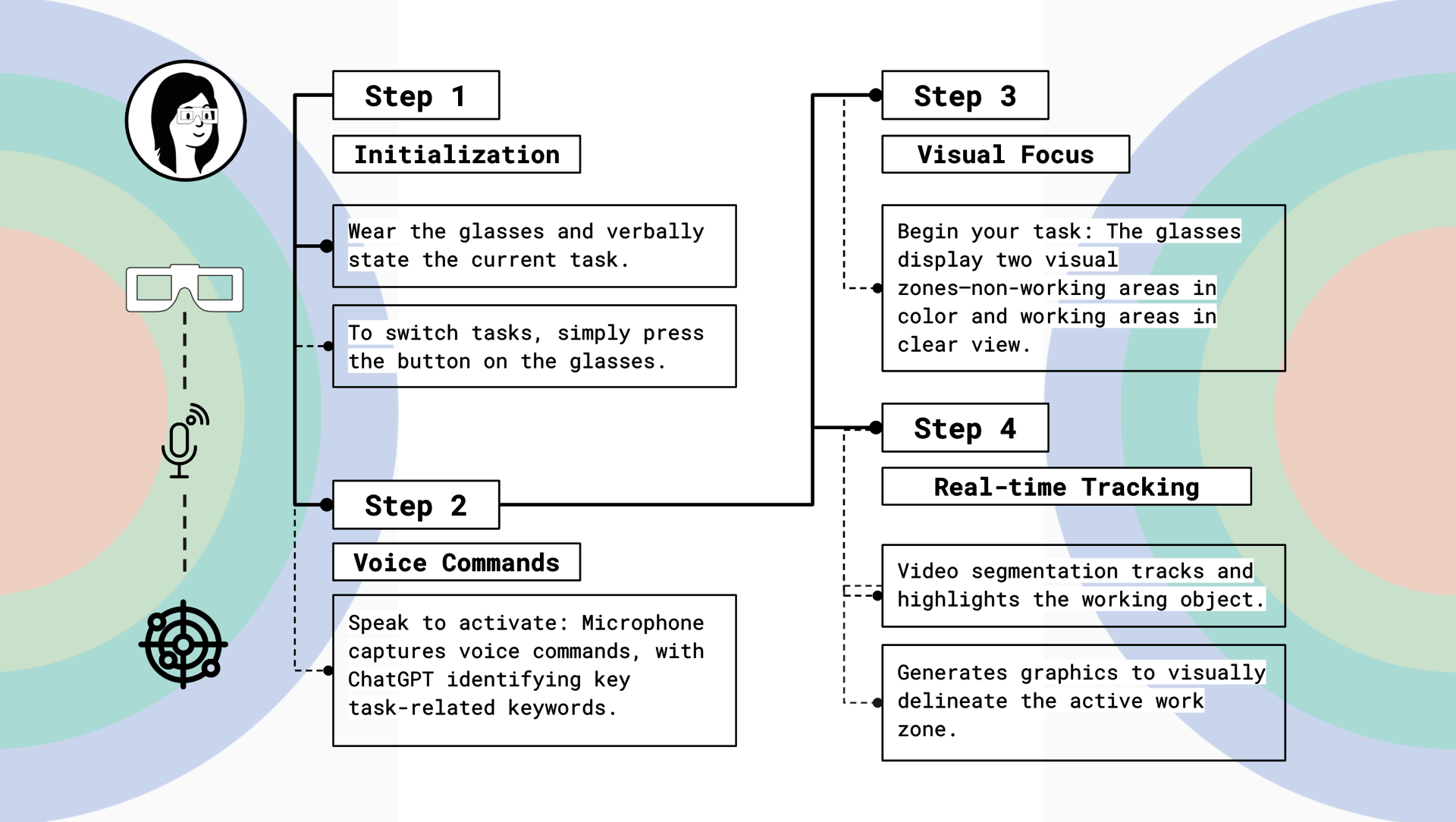
Diagram illustrating the user operation steps of the ChromaCalm AR glasses, showing initialization, voice command activation, visual focus adjustments, and real-time object tracking for enhanced task concentration.
Explore the transformative effects of ChromaCalm AR glasses through this engaging video. Witness first-hand the unique visual modifications users experience through the lens. The video showcases the real-time effectiveness of the glasses in enhancing focus and productivity by filtering out distractions and emphasizing task-relevant information. See the direct impact these innovative AR glasses have on users, improving their ability to concentrate and complete tasks more efficiently.
Video file
Visual demonstration of ChromaCalm AR glasses in action, illustrating how the lenses dynamically adjust to enhance user focus and block out distractions, greatly aiding in task completion.
The diagram presents a detailed schematic of the ChromaCalm system, illustrating the interconnectedness of its components to enhance user focus through augmented reality glasses. It highlights the flow from voice commands processed by an ESP32 control board to the manipulation of visual outputs. Key elements include the ESP32 CAM, which records the workspace environment, and software interfaces for automatic speech recognition and text processing using advanced APIs. The system employs real-time video segmentation technology to adapt visual displays, dynamically altering transparency in the glasses' lenses to create focused zones of visual clarity, aiding concentration and reducing cognitive load. This setup demonstrates a sophisticated integration of hardware and software, aiming to optimize the user's visual interaction with their environment.
Image
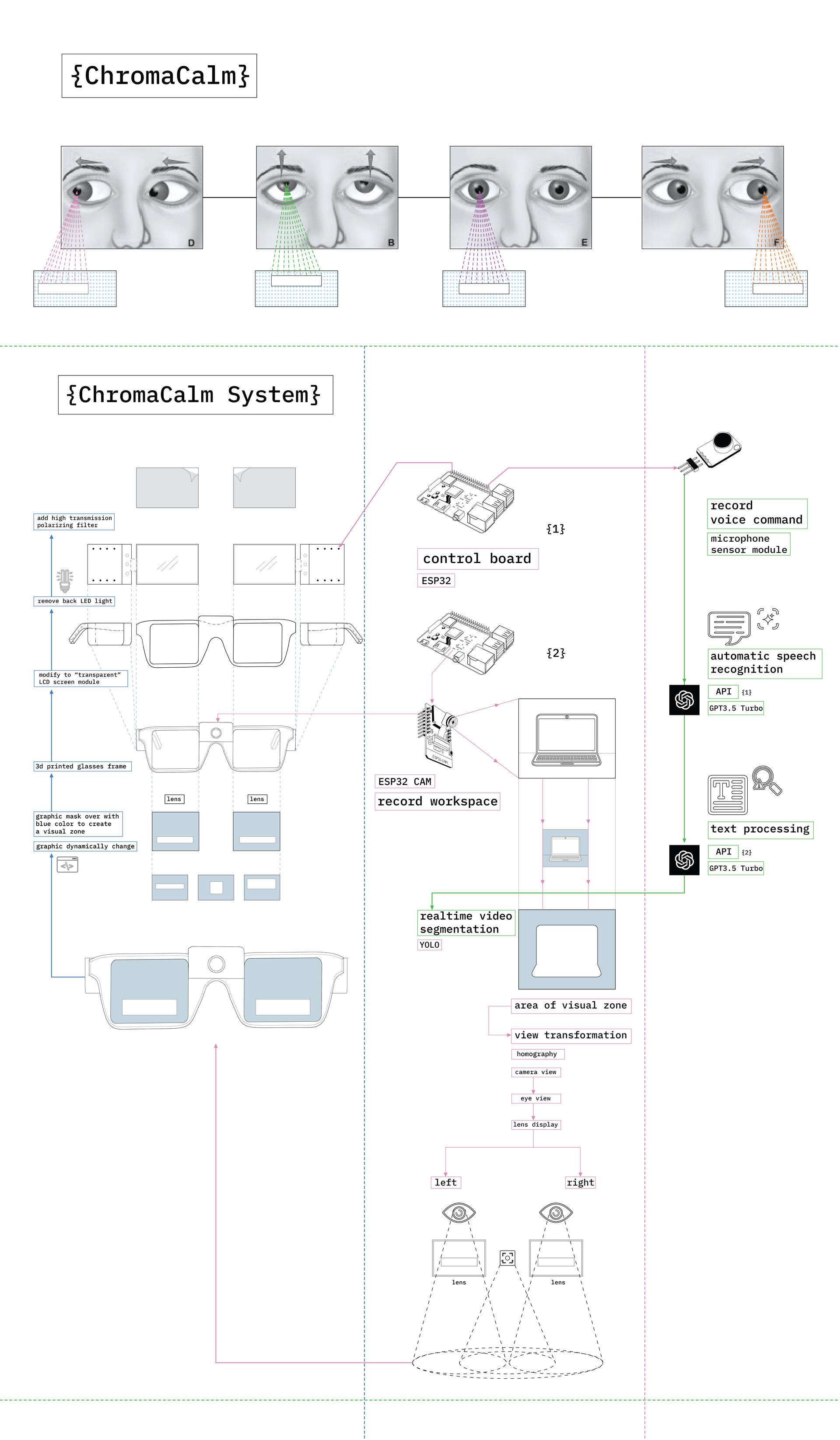
Technical schematic of the ChromaCalm system showing the integration of hardware and software components, including ESP32 control board, voice recognition, and AR display adjustments, which collectively enhance user focus through visual modulation.
EXHIBITION IMAGES
